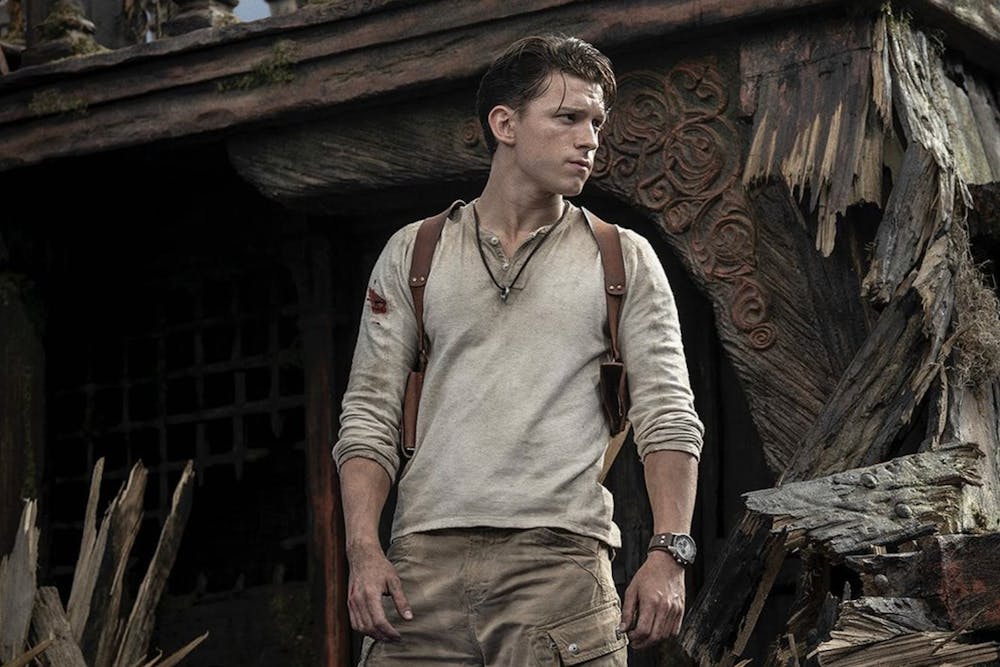After the string of videogame movie misfires that included “Assassin’s Creed” (2016), “Tomb Raider” (2018) and “Mortal Kombat” (2021), fans of the popular PlayStation exclusive “Uncharted” had their doubts upon hearing that director Ruben Fleischer would be bringing the iconic series about an adventurous treasure hunter to the big screen. As one of those fans, I can now say that those doubts have been laid to rest. With quippy dialogue, physics-defying action and a sense of swashbuckling enthusiasm pervading its every moment, “Uncharted” succeeds as an exciting adventure film that perfectly captures the spirit of its gaming inspiration.
The “Uncharted” videogame series puts players in the role of Nathan Drake, a witty treasure hunter who fends off deadly adversaries while traversing the globe in search of history’s lost fortunes. Fleischer's adaptation acts as a prequel to the narratives set forth in the four games by introducing audiences to a slightly younger Drake before he has taken up the mantle of famed explorer. The film follows Drake (Tom Holland) as he embarks on his first adventure with Victor Sullivan (Mark Wahlberg), a major character from the games and Drake’s closest ally. Racing from New York to Barcelona to the Philippines, the new partners compete with a violent millionaire (Antonio Banderas) and his henchmen to recover Ferdinand Magellan’s missing fortune of $5 billion in gold.
There is nothing about “Uncharted” from a narrative or technical standpoint that separates it from the plethora of CGI-heavy action movies circulating in the world today (“Fast and Furious,” I’m looking at you). Still, the film is memorable. It achieves the level of light entertainment it seeks to provide, a result that can be credited to the obvious passion with which Fleischer and his team adapted the games. This starts with the writing. From the instant they meet, Drake and Sullivan engage in banter reminiscent of the playful competitiveness that exists between them in the games. Drake’s tongue is often quicker than his gun, and Holland excels at embodying that verbal savvy on-screen.
It was not just buzzy writing that originally drew so many players to the “Uncharted” games, however. Described by PlayStation as providing a “cinematic action-adventure experience,” the series was made famous by its Hollywood-style action sequences conducted on blockbuster set pieces. Fleischer knew that for his adaptation to succeed, the action would have to match the level of spectacle achieved in the games. He ultimately meets this demand through the extensive use of CGI, which — though stripping the action of any grounded sense of physicality — allows the director and his crew to recreate the outlandish stunts from the games to an uncannily accurate degree. When watching an unconscious Drake fall from a cargo plane only to wake and then leap from one plummeting crate to another, pummeling scores of freefalling enemies as he fights to reboard the aircraft, it is easy to dismiss the action in “Uncharted” as being unrealistic to the point of ridiculous. But this was exactly what now-devotees of the series felt when they played the games for the first time, controlling Drake as he scales a derailed train car dangling from a cliffside in the Himalayas or swings from the inner machinery of a bell tower in Madagascar. It’s supposed to be ridiculous; Fleischer knows this, and fans of the games will appreciate his faithful execution of the film’s improbable action sequences.
More than thrilling action and snappy dialogue, however, the joyful escapism is what makes the “Uncharted” games special for millions of players. Traveling to the world’s most stunning locales, hunting for treasure, solving age-old mysteries — these are the childhood fantasies that the “Uncharted” games allow its players to actualize, even if only through their eyes and imaginations. Fleischer’s film adaptation works as well as it does because it carries this spirit of childlike wonder and excitement throughout its entire runtime. The mood is jumpy, the pace quickening and the characters reveling in the exhilaration of their adventure. If videogames are played because they are fun, it follows that the measure of a videogame movie should be how fun it is for the audience to watch. “Uncharted,” a movie with zero pretensions and an abundance of extravagant spectacle, more than measures up.
Jack Torpey '24 (he/him) is an Arts and Culture Editor. He writes film reviews for the Reel Critic column.
Jack is studying English with a minor in Film and Media Culture. Outside The Campus, he works as a peer writing tutor at the Writing Center and is a member of the Middlebury Consulting Group.




